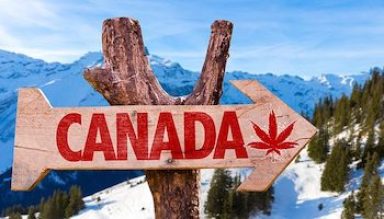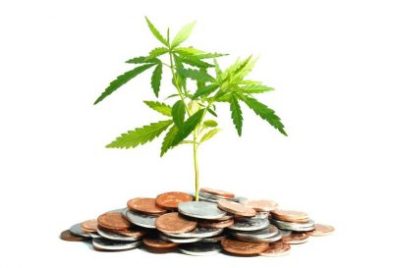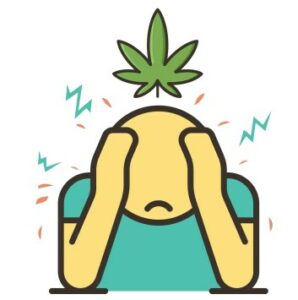What is the four-step cannabis solution to Canada’s recession?
Canada’s recession is here, masked only by the large influx of immigrants keeping the job numbers up. But when you control for population growth, Canada is in an economic recession.
What’s the solution?
Whether it’s left-wing parties calling for “stimulus” or right-wing parties calling for “austerity,” you won’t find solutions listening to the elites and gatekeepers responsible for this mess.
Too many dollars are chasing too few goods. There aren’t enough houses to accommodate the record number of immigrants Justin & the WEF agenda have brought into the country.
And now, interest rates are climbing. Of course, interest rates should have risen years ago, but as “conventional policy,” we don’t rely on market prices for the price of money.
Despite the failure of price controls in every other aspect of the economy (and recognition of this fact by mainstream economists), money itself is considered mysterious and magical.
Allow supply and demand to determine interest rates? Are you nuts?! An unelected board room full of central bankers knows how to plan the monetary economy. Trust them.
Well, we trusted them. And now look at where we are. Canada’s recession isn’t ending soon, so let’s explore some alternative ideas.
For example, cannabis can solve the housing crisis, climate change, and undermine our banker-elite-controlled monetary system.
We don’t even need a majority on our side. From the American Revolution to today’s “woke intellectuals,” 10% of the population dedicated to a cause can influence the masses.
Ending Canada’s recession with the cannabis solution could be done tomorrow. We’ve outlined how we could do this in four easy steps.
Why Does the Economy Suck Sometimes?
Canada’s recession is here. It’s not hypothetical. It’s a fact. On a per capita basis, Canada’s gross domestic product (GDP) has fallen in the past four quarters, and there’s no sign of it getting any better.
Poor economic numbers stem from rising interest rates. As we’ve discussed before (and mentioned above), interest rates are the price of money over time. Having a “central bank” institution set these prices like a Soviet planner is failed economics.
Canada’s recession is like a hangover from drinking excessive alcohol. Premiers are calling on the central bank to stop raising rates, but they’ve only demonstrated their ignorance.
It’s like building a rocket ship while ignoring the laws of physics. And then wondering why you’re rocket can’t get off the ground.
Why is the cost of living going up? Not just in the last 23 years but over the course of the 20th century. The value of our money has decreased.
This isn’t how markets are supposed to work. Look at the 19th century from industrialization onward. Our living standards rose because money is supposed to retain its purchasing power.
If anything, an expanding economy of goods and services means the purchasing power of your cash grows. We should be far more prosperous today than we are.
“Minimum basic income” shouldn’t be a government policy. It should be the natural order based on previous generations’ accumulating capital.
How Did This Happen?
One can imagine an alternate 20th century without central banks, income taxes, authoritarian ideologies, and two world wars. Imagine if your great-grandparents could retain their wealth and pass it on to their children and their children’s children.
By the 1970s, nobody should have been working a 40-hour week to put food on the table. Instead, the 1970s saw inflation and one financial crisis after the other.
Elites have stolen our inheritances. Our generational wealth. They’ve rigged the game to keep themselves on top at the expense of the rest of us.
Free markets are supposed to be free. The next generation of entrepreneurs displaces the old capitalists who have become static and regimented in their ways.
(And this still happens to some extent, despite state interference. Look at the rise of Microsoft and Apple in the 1980s compared to the stagnant and backwards-looking corporations of IBM and Xerox).
Wealth is not static but contingent on voluntary exchange. Unless you accumulate riches based on other people’s taxes.
Or by using the machinery of the state to undermine the next generation of entrepreneurs and consolidate your business interests.
Which is what has happened. Far from free markets creating a world where corporations take over, it’s been the “middle-way” between socialism and capitalism that created the conditions for political lobbying.
Without big government, there is no big business.
Why Nobody Wants to Invest in Canada
Canada’s recession is here, and the cannabis solution is a long way off.
Data suggests business productivity is at its lowest since 2017. The lack of investment in the country is alarming Canadian hedge fund managers and investors.
A report from the Bank of Canada suggested companies are only interested in our natural resources. And the Trudeau government has done everything to retard development in the name of “climate.”
Consumer confidence is down, and Canadians are at historical records of household debt.
Given Canada’s recession, many expect the central bank to begin cutting interest rates in the spring. But how exactly does this solve the problem? All it does is reinflate the bubble. It kicks the can down the road.
As mentioned, cannabis can solve the housing crisis, climate change, and undermine our banker-elite controlled monetary system. And we’ve outlined four steps to make this happen.
#1 Solving Canada’s Recession with Cannabis (Housing)
Hemp-based construction is apparent and a topic we’ve covered before. Hempcrete is a sustainable and cost-effective solution to address one of the many issues surrounding housing shortages in Canada.
Of course, the government needs to gut regulations restricting a robust hemp industry. They can start by eliminating income taxes for hemp farmers and processors.
This would undoubtedly incentivize people to get into the hemp industry.
Likewise, since we’re on the topic of gutting anti-human regulations, have you seen the number of empty shipping containers this country has? These can retrofitted (using hemp-based materials) to create affordable housing options.
All we need are politicians and bureaucrats to step out of the way.
#2 Solving Canada’s Recession with Cannabis (Climate Change)
Politicians typically tax, spend, and claim they’re doing good. Look at Justin Trudeau’s carbon tax for proof. It’s destroying businesses and jacking up the cost of living for every single Canadian.
But in no way does paying higher taxes change the fucking weather. As Clyde Do Something says, we should be ecological, not environmental.
Thus, we should emphasize the positive impact of hemp cultivation. From conserving water to preventing deforestation, hemp absorbs more carbon dioxide than many of its plant peers.
A climate change policy emphasizing carbon taxes and subsidizing massive corporations providing “green” technology is not how we conserve the planet for the future.
Embracing free markets, private property, and cannabis/hemp cultivation is the way forward.
#3 Solving Canada’s Recession with Cannabis (Exports & Trade)
Of course, growing a lot of weed won’t starve off Canada’s recession. Some of it we’ll have to export. And why not? As other countries loosen their laws on cannabis and hemp, new markets and opportunities open up.
And Canada can be ready. Instead of Canada being synonymous with “woke” or “ice hockey,” we can – through our actions – craft a reputation for quality cannabis and hemp products.
Canada can be a leader in the global cannabis/hemp market.
#4 Solving Canada’s Recession with Cannabis (Money & Debt)
To correct Canada’s recession with the cannabis solution doesn’t even require you to like cannabis. You could think it’s one of the worst drugs out there and belongs in the same category as heroin.
You’re wrong, but that’s fine. We’ll agree to disagree because the next step is the most radical and unlikely to bear fruit. But one can dream.
A robust cannabis/hemp industry creates jobs across various sectors. This helps get people out of debt and provides stable employment opportunities. This is partly how the cannabis solution corrects Canada’s recession.
The country’s entrepreneurs can also explore this diversified plant’s potential with lower taxes and regulations.
But ultimately, hemp can become money itself.
The Case for Hash Coin?
While cannabis/hemp isn’t the best form of money, it’s a better alternative than the status quo. Currently, money comes into existence through loans. If every Canadian paid off their debt, then the money would cease to exist.
That’s why the system is fraudulent and doesn’t need “reform.” It needs to be – metaphorically – burned to the ground.
Money is a tool for facilitating exchange. And just as you can use a hammer to build a house, the same hammer can be used as a murder weapon.
Right now, banks use the money as a murder weapon. Backing our dollars with something scarce, traditionally gold or silver, but cannabis could work too, is how we end the banker occupation of Canada.
Reversing Canada’s recession requires some cannabis solutions.
“Commodity” money is superior to fiat currency in every possible way. There is intrinsic value in the asset (whether gold or hash-coin). Natural factors, such as mining or farming, limit its supply. Bankers can’t devalue our savings by typing numbers into a computer screen.
This protection against bank and government manipulation is the number one reason to reject fiat currency. Like conserving the planet for our children’s children, we can ensure future generations aren’t born as debt-slaves to unaccountable elites.
Since commodity money is a store of value, its purchasing power will increase over time, making it a reliable asset for savings and passing your wealth on to the next generation.
Canada’s Recession (& the 4-Step Cannabis Solution)
Canada may be alone in its recession for now. While the United States reports modest economic growth, Canada is shrinking.
And perhaps it’s for the best. They say it’s always darkest before dawn, which may be the case here.
Canadian stereotypes paint us as passive, left-wing cultists who think the only two healthcare options are either our Soviet model or the US crony-capitalist model (ignoring the success of Europe’s two-tier system).
But the 2022 Freedom Convoy put a lot of those stereotypes to rest. Now, the state broadcaster is concerned about “growing right-wing extremism” in the country.
Which is code for people waking up to how badly the system has been ripping them off.
Unfortunately, many think electing a new government will fix things. But disillusionment with the new government will become evident sooner or later.
And when it does, we’ll be here, promoting this four-step cannabis solution to Canada’s recession.
- SEO Powered Content & PR Distribution. Get Amplified Today.
- PlatoData.Network Vertical Generative Ai. Empower Yourself. Access Here.
- PlatoAiStream. Web3 Intelligence. Knowledge Amplified. Access Here.
- PlatoESG. Automotive / EVs, Carbon, CleanTech, Energy, Environment, Solar, Waste Management. Access Here.
- PlatoHealth. Biotech and Clinical Trials Intelligence. Access Here.
- ChartPrime. Elevate your Trading Game with ChartPrime. Access Here.
- BlockOffsets. Modernizing Environmental Offset Ownership. Access Here.
- Source: https://cannabislifenetwork.com/canadas-recession-the-4-step-cannabis-solution/
- :has
- :is
- :not
- :where
- $UP
- 1
- 2017
- 2022
- 23
- 237
- 300
- 4-step
- a
- About
- above
- absorbs
- accommodate
- Accumulate
- across
- actions
- address
- affordable
- affordable housing
- After
- against
- ago
- Alcohol
- All
- alone
- also
- alternative
- always
- American
- an
- and
- any
- anything
- apparent
- Apple
- ARE
- AS
- aspect
- asset
- At
- Authoritarian
- backing
- badly
- Bank
- bank of canada
- banker
- bankers
- Banks
- based
- basic
- basis
- BE
- Bear
- because
- become
- been
- before
- begin
- being
- belongs
- BEST
- Better
- between
- Big
- board
- born
- brought
- bubble
- build
- Building
- burned
- business
- businesses
- but
- by
- calling
- CAN
- Canada
- Canadian
- Canadians
- cannabis
- Capita
- capital
- capitalism
- capitalists
- carbon
- carbon dioxide
- case
- Category
- Cause
- central
- Central Bank
- central bankers
- Central Banks
- Century
- change
- Children
- claim
- Climate
- Climate change
- Climbing
- code
- Coin
- comes
- commodity
- compared
- computer
- computer screen
- concerned
- conditions
- confidence
- considered
- consolidate
- construction
- Containers
- control
- controlled
- controls
- Convoy
- Corporations
- correct
- Cost
- cost-effective
- cost-effective solution
- could
- countries
- country
- country’s
- course
- covered
- craft
- create
- created
- creates
- Creating
- crisis
- cultivation
- Currency
- Currently
- cutting
- Debt
- decreased
- dedicated
- deforestation
- Demand
- demonstrated
- Desjardins
- Despite
- Determine
- Development
- DID
- discussed
- diversified
- do
- does
- Doesn’t
- doing
- dollars
- Domestic
- done
- Dont
- down
- dream
- Drugs
- easy
- Economic
- Economic growth
- economic recession
- Economics
- economists
- economy
- either
- eliminating
- emphasize
- emphasizing
- employment
- end
- ending
- enough
- ensure
- entrepreneurs
- Ether (ETH)
- Europes
- Even
- Every
- everything
- evident
- exactly
- example
- exchange
- exist
- expanding
- expect
- explore
- export
- exports
- extent
- facilitating
- fact
- factors
- Failed
- Failure
- Fallen
- far
- farmers
- farming
- few
- Fiat
- Fiat currency
- financial
- financial crisis
- Find
- fine
- Fix
- food
- For
- form
- Forward
- four
- fraudulent
- Free
- Freedom
- from
- full
- fund
- fund managers
- future
- game
- GDP
- generation
- generational
- generational wealth
- generations
- get
- getting
- Global
- going
- Gold
- good
- goods
- Government
- Government policy
- gross
- Ground
- Growing
- Growth
- hammer
- happen
- happened
- happens
- hash
- Have
- having
- healthcare
- hedge
- hedge fund
- helps
- Hemp
- here
- higher
- historical
- House
- household
- houses
- housing
- How
- How To
- HTML
- HTTPS
- IBM
- ideas
- ideologies
- if
- Ignorance
- imagine
- Immigrants
- Impact
- in
- incentivize
- Income
- Increase
- industry
- inflation
- influence
- influx
- instead
- Institution
- interest
- Interest Rates
- interests
- into
- intrinsic
- Invest
- investment
- Investors
- issues
- IT
- ITS
- itself
- Job
- Jobs
- jpg
- just
- Justin
- Keep
- keeping
- Kicks
- Lack
- large
- Last
- later
- Laws
- leader
- like
- LIMIT
- Listening
- living
- Loans
- lobbying
- Long
- Look
- Lot
- lower
- lower taxes
- lowest
- machinery
- Mainstream
- Majority
- make
- Making
- Managers
- Manipulation
- many
- Market
- Market Prices
- Markets
- masses
- massive
- materials
- max-width
- May..
- means
- mentioned
- Microsoft
- Mining
- model
- modest
- Monetary
- money
- more
- most
- murder
- mysterious
- name
- Natural
- Need
- needs
- New
- next
- no
- now
- number
- numbers
- occupation
- of
- off
- Old
- on
- ONE
- only
- open
- opportunities
- Options
- or
- order
- Other
- our
- out
- outlined
- over
- paid
- paint
- parties
- pass
- Passing
- passive
- past
- paying
- peers
- People
- people’s
- per
- perhaps
- Physics
- plan
- planet
- plato
- Plato Data Intelligence
- PlatoData
- policy
- political
- Politicians
- population
- positive
- possible
- potential
- power
- preventing
- previous
- price
- Prices
- private
- Problem
- processors
- Product
- productivity
- Products
- promoting
- proof
- property
- prosperous
- protection
- provides
- providing
- purchasing
- put
- quality
- radical
- raising
- Rates
- ready
- reason
- recession
- recognition
- record
- records
- regulations
- reliable
- rely
- report
- Reports
- reputation
- require
- requires
- Resources
- responsible
- REST
- restricting
- retain
- Revolution
- rigged
- Rise
- Risen
- rising
- road
- robust
- rocket
- Room
- ROSE
- s
- same
- Savings
- saw
- say
- Scarce
- Screen
- Sectors
- seen
- Services
- set
- Shipping
- shortages
- should
- side
- sign
- Silver
- since
- single
- So
- solution
- Solutions
- SOLVE
- Solving
- some
- something
- sometimes
- Soon
- spend
- spring
- stable
- standards
- start
- State
- States
- Status
- Stem
- Step
- Steps
- Still
- stolen
- Stop
- store
- store of value
- success
- such
- Suggests
- superior
- supply
- Supply and Demand
- supposed
- Surrounding
- sustainable
- synonymous
- system
- table
- Take
- tax
- Taxes
- Technology
- than
- that
- The
- The Future
- The State
- their
- Them
- themselves
- then
- There.
- These
- they
- things
- think
- this
- those
- Through
- time
- to
- today
- today’s
- tomorrow
- too
- tool
- top
- topic
- trade
- traditionally
- Trudeau
- Trudeau government
- Trust
- trusted
- two
- typically
- Ultimately
- Undermine
- undoubtedly
- United
- United States
- unlikely
- us
- use
- used
- using
- value
- various
- voluntary
- wants
- Water
- Way..
- ways
- we
- Wealth
- Weather
- weed
- week
- WEF
- What
- when
- whether
- which
- while
- WHO
- why
- Wikipedia
- will
- with
- without
- wondering
- Work
- working
- world
- Worst
- would
- Wrong
- years
- you
- Your
- youtube
- zephyrnet



















